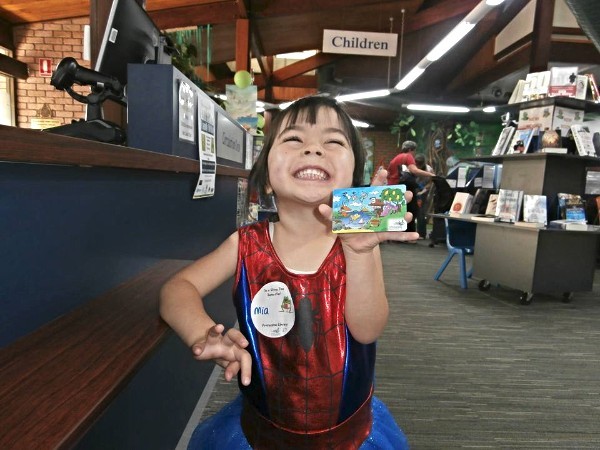Queensland libraries are a key ally in efforts to address sliding literacy rates among school children.
A News Limited newspaper article recently reported that: “Australia is facing a ‘national crisis’ on literacy with students showing up to kindergarten less prepared than ever before.”
“Experts say distracted parents are not doing enough to equip their children with reading and speaking skills and are wrongly mistaking developing those skills as solely the job of a teacher,” according to the report.

For children like Mia, proudly displaying her very own membership card, libraries are a hub for early literacy development. Photo courtesy of Whitsunday Regional Council Libraries
First 5 Forever, a state government funded initiative covering over 98% of the Queensland population, is helping to address this negative trend by offering families with newborns, toddlers and pre-schoolers vital support and resources. The initiative is delivered through public libraries and is provided free to families with children aged zero to five years.
Families are offered age-appropriate early literacy sessions and are supported to be their child’s first and most important educator through simple everyday activities they can do in the home and out and about.
Good news
In a recent report evaluating First 5 Forever, Queensland University of Technology researchers have given the program the thumbs up, revealing strong impacts across all eight target measures ranging from cultural participation to community development.
Key findings
Parents feel vulnerable:
Community connector: There is evidence that public libraries are highly appropriate vehicles through which to support, facilitate, and lead early literacy development programs. While primarily built around promoting and improving early literacy, the First 5 Forever initiative is also a community facilitator and connector, supporting families and children through a culture of participation and lifelong learning. (p.1)
Leading the way: First 5 Forever is a leading example of Australian library-based early and family literacy program. (p.12)
Accessible: First 5 Forever activities are helping parents find resources for early literacy learning with their children using ordinary objects they can find around the home or in the local park. (p.25)
Making it easy: First 5 Forever activities help parents sort through what can seem like a sea of information about parenting, and demonstrate simple ways to connect with their children, at the same time supporting and educating them in the development of pre-literacy or early literacy skills. (p.26)
Fun: The reasons for singing, talking and reading to young children are explained, and parents are empowered with knowledge about why making these connections is developmentally important. (p.26)
Social: The First 5 Forever initiative is proving to be a catalyst for social connection and community development (p.34)
What do families say?
“The First 5 Forever program inspired my son’s first birthday party theme. Thank you for helping my Son and I bond over the love of books, the tools I have learnt through the First 5 Forever program have been invaluable”
“ seventeen months old now, and she’s heavily into books and reading and numbers, and a lot of that, I think, is because of the First 5 Forever program.” Parent interview conducted by external evaluator, MHM
“Its aim is literacy anywhere and everywhere… in a shop, at home, reading a book, singing a song. Just interacting with your child” Parent interview conducted by external evaluator, MHM
Comments
Your email address will not be published.
We welcome relevant, respectful comments.